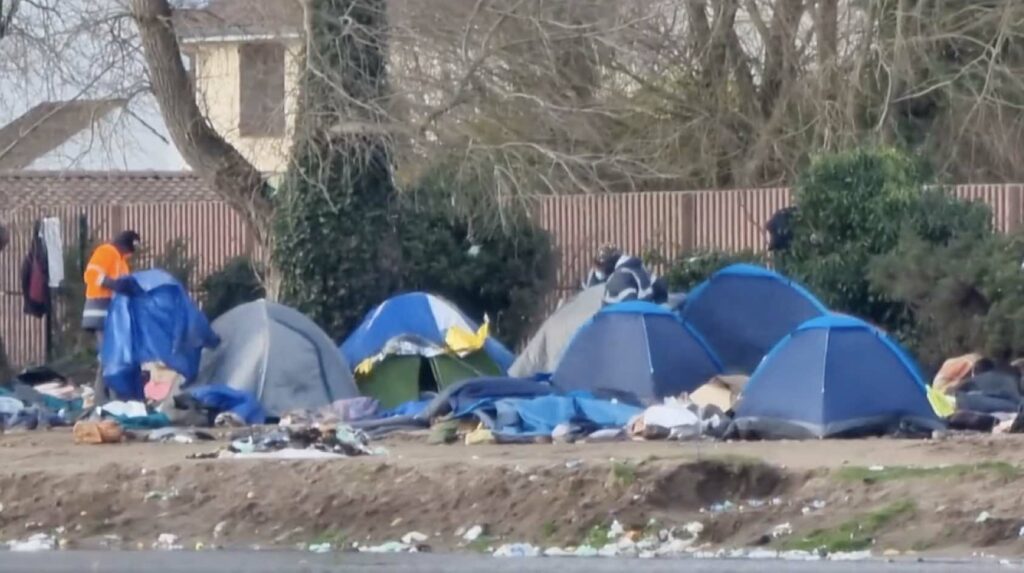Despite the dismantling of the “Calais jungle » in 2016, hundreds of operations are still carried out each year to dislodge migrants in this north-western region of France. French authorities are the ones ordering these actions, but a private subcontractor, APC, is the one in charge of confiscating migrant belongings and tents.

Screenshot from a video published by the Twitter account of “Auberge des Migrants” where we can see APC employees removing tents from a migrant camp in Calais, northern France
Each week, a well-oiled tragedy plays out in the camps of Calais. Five days ago, on a Sunday afternoon, police forces began an operation to evacuate yet another migrant camp. Benoît Desferet, the departmental director of public security in Pas-de-Calais, was on the ground to ensure that the proper procedure were followed. As always, his team’s mission was to dislodge the people living there, without tampering with the tents or handling the migrants’ rudimentary belongings. The eviction, however, will eventually end with the confiscation of their personal effects. Tents, comforters, documents are, in theory, stored in a safe place and can later be recovered. In reality, 71% of the times, things don’t go as planned and cases never make it to trial, according to a report.
Police forces are not the ones to physically dismantle the area, because they are not authorized to do so by law. In a video published on Twitter by the association Auberge des migrants, hooded men in cleaning clothes can be seen removing the tents. An annual report by Humans Rights Observer reveals that a company called Apogée Propreté Conseil (APC), based in Marck, a neighbouring municipality of Calais, is mandated by the state to carry out this work.
In this investigation we analyzed photos and videos to detect distinctive elements than can be linked to this company. Our research shows that the same outfits were worn by the « cleaners » during different operations. On the photos of an article of Reporterre published on February 5, 2021, men dressed in a similar fashion are in charge of moving the personal effects of migrants. Same thing on Tuesday 4, 2022, as can be seen on a video on Twitter. Looking at different sources, it would seem that the APC company is the only one mandated since 2019 in Calais. This is not specific to the city of Calais. We can find equivalent operations in Grande-Synthe with another cleaning company “Ramery Propreté”. Its agents dismantle the camps under the authority of the prefecture but we could find no direct presentation of this mission in their institutional communication.
What is the real mission of APC?
On the Internet, APC is very discreet: apart from the administrative information available online, there is no trace of a website, social networks or any presence in the Yellow Pages. As far as its activities are concerned – not taking into consideration their work in the migrant camps – only one article in Nord Littoral mentions this company. In it, we learn that the city of Calais has called upon the company to restore the 318 military graves of the North Cemetery.
Before starting his own business, Didier Daens, a 54-year-old man, worked for Atalian Group, a French cleaning company, as a manager. In January 2016, he created the company APC and now owns three other companies. In 2019, he created a second cleaning company (DNS) located at the same address as the APC company as well as a fund management company (SDJ) and a real estate company (FVJD) in 2021. APC is a company under the nomenclature 8121Z. This code refers to routine cleaning of buildings, a subclass that includes the cleaning of all types of buildings such as offices, houses or apartments, factories, stores, public buildings and other premises for commercial and professional use and apartment buildings. Nowhere is it indicated that they can dislodge and clean camps. The nomenclature of the company « Current cleaning of buildings » seems rather vague, especially in view of their given competence to collect the migrant possessions. Does that fall under the « maintenance of green spaces » line?
INSEE insists on the fact these nomenclatures are not audited. It is recommended that the company managers should read the advice about their collective agreements and about the advised insurances for the exercise of their activity.
A blurry Public market
According to a report published by the association Human Rights Observer in 2019 : « the cleaning teams of the company APC are systematically present and destroy, collect and throw away the belongings and shelters designated by law enforcement. » The company has been working for four years on the dismantling of camps in Calais and its surroundings under the orders of the prefecture. In 2021, at least 9703 items and goods have been confiscated from migrants according to HRO. In 2020, 3959 items were confiscated.
A public procurement contract has been concluded between the institution and APC, according to the association. The latter allows a public or private buyer, including the State, to meet its needs in terms of works, supplies and services.The rules that apply to these contracts are defined by the legislation on public procurement. This contract is signed for a fee between the prefecture and APC. The amount of this contract is not publicly known. Indeed, the prefecture of Pas-de-Calais refuses to reveal the sums paid to the company, says the report.
We could not retrieve the conditions under which this contract was obtained. In the meantime, the number of camp dismantlement keeps rising with 125 evictions of informal settlements recorded in Calais in December 2021 by the Human Rights Observers Association.
NA, CM, MG and CA
Black Box
On a video showing an eviction of migrants in a makeshift camp in Calais published on Monday 3 January 2022 by the association L’Auberge des migrants on Twitter, we wondered about the men who collect the evictees’ belongings. We were surprised to see that no CRS nor police officers (who remain on the sidelines, in line) were taking part in this operation. These men are hooded and wear outdoor maintenance workers’ suits.
We reviewed several articles about previous evacuations in the Nord-Pas-de-Calais region, and learned that the State was calling on private service providers, in particular cleaning companies, to do the » dirty work « : the Ramery group in Grande-Synthe, the Apogée Propreté Conseil (APC) company in Calais. As the events of the video took place in Calais, we focused on the APC company. We quickly found the operation’s exact position on Google Earth thanks to the street names mentioned in a La Voix du Nord’s article and some physical elements present on the video (hedges, rails, prefab).
After a vain analysis of images and videos circulating on social networks to find a trace of APC identification, we scoured company websites in search of information. Société.com, Le Figaro entreprises, Manageo revealed few information: no turnover, only capital stock, official nomenclature, address and owner. The nomenclature of the company « Current cleaning of buildings » seems rather vague, especially in view of the activity of collecting the migrants’ possessions. It must be part of « maintenance of green spaces ». Didier Daens, the company’s director, owns a total of four businesses. APC and DNS are both cleaning companies, one created in 2016, the other in 2019. Then, FVJD, a real estate company, and SJD, a SAS fund management, all created in 2021. There is no trace of him on social networks except on LinkedIn where only his former job at TFN, which became Atalian in 2009, is listed. It is a large company of subcontracting to companies in the cleaning business. We were also able to identify his wife, Fabienne Daens, on Facebook and on a liquidation act of Didier Daens’ first company, named Polytech.
Press releases and reports of Human Rights Observers, an NGO specialized in monitoring the violation of migrants’ human rights in Calais, have provided us with data on the expulsions in 2020 and last December as well as the percentages of migrants’ belongings ending up in the garbage. Their reports confirmed us the systematic presence of APC during routine eviction operations organized by the police. Unfortunately, we have not been able to find any public contracts or invitations to tender that would have specified the nature of the mission of this private service provider for the French state. If the Pas-de-Calais department is quite transparent about its public contracts, this is less evident for the Pas-de-Calais prefecture and the government website marchespublics.gouv.
